Unique is a word that barely seems adequate to describe Lee Hae-jun. One of South Korea’s emerging filmmakers, writer-director Lee Hae-Jun has already made a name for himself in his early 30s by not really conforming to any particular genre. First gaining major attention with his script about a town where everyone believes in UFOs, Au Revoir, UFO (2003), the filmmaker continually challenges outsiders’ traditional ideas of Korean cinema. His debut feature as a director, 2006’s Like a Virgin, is a comedy about a transgender teenager who winds up competing in wrestling at a national level. Although writing on actor-director Ryoo Seung-wan’s Arahan (2003) and Lim Pil-seong’s Antarctic Journal (2005) he has more recently continued his work as a director. Castaway on the Moon (김씨표류기 aka Kim’s Island), his second film as a director, continues this off-beat attitude.
Kim Seung-Keun (Jung Jae-Young) has had enough with his lot in life, and leaps from a bridge overlooking the Han River. Even this goes wrong, and he washes ashore on a small island. Despite being able to view the city lights of Seoul, he is unable to swim and is marooned for all intents and purposes. Slowly but surely he adapts to his environment, creating his own little paradise home. As Mr. Kim learns to survive on the island, he is also being watched by Kim Jung-Yeon (Jung Ryeo-Won), a recluse who has shut herself away in her room, occasionally peeking outside to take a photo of the moon. It it while doing this that she spots Mr. Kim’s ‘HELP’ signal, and the pair form an unlikely relationship across the Han.
Winner of a Special Jury Prize at the Fantasia International Film Festival, Castaway on the Moon is a refreshingly original and quirky take on the romantic comedy. While completely indebted to the simple formula at the heart of all good (and more often than not bad) rom-coms, that of an impossible obstacle that separates our would-be lovers, Castaway on the Moon cleverly places itself in a world that is entirely its own. It is revelatory to find so much magic in what is essentially a two-stage setup, with only Kim’s island and the apartment of a agoraphobic hoarder to keep us occupied. Kim Byung-seo’s alternatively hyper-real bright and depressingly muted photography reflects the moods of these hapless heroes, but more than that: these are incredibly likable and well-drawn characters. We meet both characters at the lowest point in their lives, and through such an intimate lens, we gradually share that glimmer of hope they both begin to share. It is rare for such a setup to be so joyous in its telling, although the comedy ranges from the broad to the Korean-specific.
The film is a romance, but it is not necessarily one that always takes place between a man and a woman. It is trite to say it, but the characters must also learn to love themselves before they can even attempt to escape their self-made prisons. Mr. Kim, for example, slowly learns to cook for himself on the island and is captivated by a sachet of noodle mix that he finds (without noodles) on the island. One of his quests is to make his own noodles and enjoy them, something he repeatedly tries and frustratingly fails at. When his mysterious observer, only communicating with him via a series of notes and sand-messages, manages to get a takeaway place to deliver the noodles to him, he rejects them: by his own standards, he has not earned it. When the moment does come, and he accomplishes his task, the scene is one of ecstatic delight: it actually manages to elicit groans of delight from the audience.
Castaway on the Moon begins with an attempted suicide, but is ultimately a celebration of life. Through the intense study of two characters, the extreme fetishisation of food and other objects that are dear to these characters and Lee Hae-jun transforms what could be a simple rom-com with a morality tale to an existential comedy that poses universal questions for the ages. In this sense, it has more in common with a Michel Gondry film than the similarly titled Tom Hanks vehicle Cast Away, yet the film works as a simple story about a marooning for those who want to simply kick back and enjoy the little things in life. It is no surprise that Mean Girls director Mark Waters is set to remake the film for an US audience, although it is hardly necessary: Castaway on the Moon is the kind of crowd-pleasing joy-fest that should help many overcome any expectations they might have about Korean cinema.
Castaway on the Moon screened as part of KOFFIA 2010, and is reviewed again here as part of The 2011 Korean Cinema Blogathon. You can catch it on World Movies on the Foxtel/Austar network in Australia on the 24th and 25th on March, 2011. It is also available on DVD from various outlets around the world.

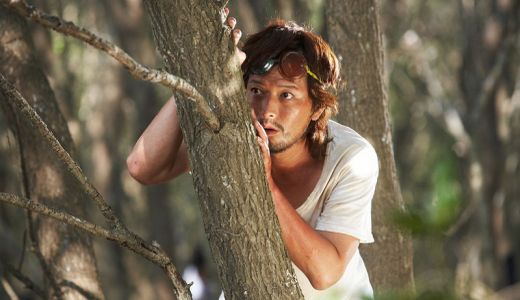
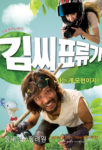
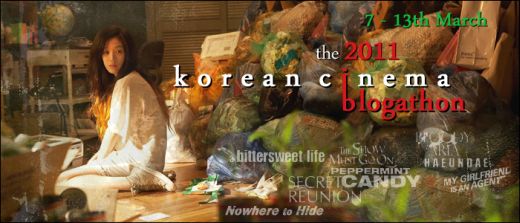
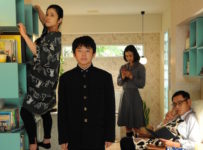

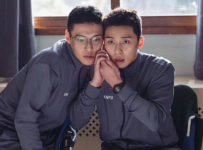
No Responses